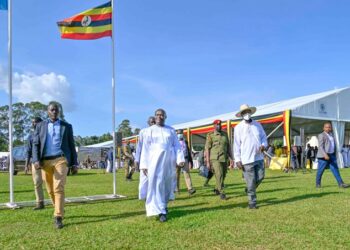Uganda’s Military Dictator recently announced that he will give UGX 60m to all the Kingdoms.
**LONG POST ALERT**
Towards independence the major political parties were DP and UPC. However, in July 1961 Kabali Masembe moblised some Baganda to welcome their Kabaka on return from attending the independence conference London.
These mammoth enthusiastic crowds lined up along the Kampala – Entebbe road chanting Kabaka Yeka (king Only). Shortly after, the slogan ans its fans evolved into a pro-Buganda Kingdom political party named Kabaka Yeka (KY). It is this KY that allied with UPC to defeat the
DP in the April 1962 general elections. Five months later on October 1962 Uganda gained independence with UPC’s Milton Obote as the Executive Prime Minister. In late 1963 the Kabaka was Buganda Sir Edward Muteesa was elected by the General Assembly as a ceremonial President of Uganda at the same time he remained the king of Buganda.
The UPC/KY alliance had been a marriage of convenience. By 1964 the alliance had started showing signs of rapture. The central government starved the Buganda kingdom of funds to run its affairs. The matter of funds even went to court but Buganda lost the case. Amidst those squables, the central government organised a refrendum over the three lost counties of Buyaga, Bugangaizi and Buwekula.
Buganda kingdom opposed it by moblising 300 armed Baganda ex-service men to go and occupy those areas but Bunyoro retaliated by moblising 2000 men ready for a fight. The refrendum was conducted and the counties of Buyaga and Bugangaizi (Kibaale) opted to revert to Bunyoro while Buwekula (Mubende) opted to stay in Buganda.
The {resident refused to sign the results of the refrendum but the Prime Minister went ahead and signed it. There was some level of hightened tension in most parts of Buganda kingdom as a result of the outcome of the refrendum. The central government took precautionary security deployments involving the Police.
At one time the Buganda Kingdom issued an altimatum for the central government to its police stations from Buganda soil. Among the few signs of bad blood between the couples was an incident where the central government refused the army brass band to play during the President/Kabaka ‘s birthday party.
Around the same time the UPC was gaining strength from the members of DP and KY who were crossing the floor to join it. However, the UPC was to suffer some set back arising from the outcome of the Dec1965 delegates conference to elect the party Secretary General. With Obote’s backing Grace Ibingira defeated the incumbent John Kakonge.
As Secretarty General and being an Ankole royal, Ibingira sought to ally with the Buganda kingdom and rejuvenate the party in Buganda.
He even reached out to prominent DP and KY leaders both in Buganda and other parts of the country who flocked into the UPC. Now that Ibingira had the numbers, he openly showed interest in wrestling the party leadership from Obote at the next delegates conference.
Ibingira left for the USA to solicit for support while Obote took along trip to the eastern block (communist) countries.
In the meantime, the security situation in Buganda remained fragile. There had been killing of innocent civillians by the Police in Nakulabye after mistakaning them for Baganda rioters. The President and Kabaka of Buganda had made attempt to import arms using a private international company.
The deal raised suspicion when it was evident that the arms consignment was to be paid for by Buganda. Around 1965 when the national assembly was debating the security situation in Buganda, Daud Ocheng unsuccessfully tried to move a motion seeking a vote of no confidence in the Prime Minister over allegations of Congo gold and ivory smuggling.
The motions was defeated. Uganda at the time was supporting pro-communist armed rebels fighting the Mubutu government.
Col Iddi Amin the then Deputy Army Commander and the Defence Minister Felix Onama were among the few government officials coordinating the support for congolese.
A consignment of arms meant for these rebels had earlier been seized by the Kenya government while on transit from China.
Tension between the central government and Buganda had escalated. UPC Secretary General Grace Ibingira had strengthened alliance with Buganda Kingdom while at the same time his differences with the party chairman Obote had deepened.
Grace Ibingira had initiated plans to overthrow the Obote led government by using the security forces. The plotters had enlisted the support of the Army Commander Brig Shaban Opolot and Ibingira’s own brother Major Katabarwa among others to carry out the plan. Brig. Opolot had earlier provided a unit of the army for the Kabaka’s security.
This force was part of the wider movement of troops between Jinja and Kampala in what has been described as uncoordinated troop movement. The Prime Minister who has upper hand intelligence had been following these developments unforlding.
He had enlisted the support of Col. Iddi Amin to counter any moves by the coup plotters to use Brig Shaban Opolot.
Soon the the plotters schemes was busted amidist widespread rumours that arms were being amassed in the kiing’s palace in Lubiri. In a last minute desperate move on 4th February1966 when the General Assembly was debating the Penal Ammendment Bill seeking to curb KY activities in Buganda, Daudi Ocheng resurrected the earlier defeated Congo Gold and Ivory motion. He contended that huge consignments of Gold and Ivory had been looted from the Congo for the benefit of Prime Minister Obote, Defence Minister Felix Onama and the Deputy Army Commander Col Iddi Amin.
He sought the suspension of the Deputy Army Commander Col Iddi Amin and a vote of no confidence in the Prime Minister Obote. The motion unanimously was passed. Obote who had been away since 1st Feb touring the northern region returned to Kampala on 12th Feb and issued a press release on 13th Feb denying the allegations.
On 22nd Feb the Prime Minister chaired a cabinet meeting in which he declared that he was taking over the powers of the government and five cabinet Ministers were arrested (including Grace Ibingira) over treasonous allegations.
They were held without trial under the Preventive Detention Act that Ibingira himself had helped to formulate when he was the Justice Minister. They remained in detention until Iddi Amin overthrew Obote years later.
The following day on 23rs Feb the Prime minister relieved the Army Commander Brig Shaban Opolot of his duties and appointed his as a military advisor to cabinet instead he elevated Col. Iddi Amin to the position of Army Commander.
Brig Shaban Opolot had got more closer to Buganda having married from the Katikiro Kavuma family.
On 24th Feb during a cabinet meeting the Prime Minister suspended the constitution alleging that a military coup was being planned.
On 25th February the Prime Ministerset up a commission of inquiry into the allegations of gold and ivory smuggling from the Congo.
On the same day the Buganda Kingdom Lukiko (parliament) convened to examine the the actions of the Prime Minister.
On 3rd March the Prime Minister issued press release to radio and TV accusing the President and King of Buganda EdwardMutesa of having sought foreign military aid. On 4th Feb the President and King retaliated by publishing the letters he had written to the Prime Minister over the constitutional developments of the recent past.
Unfortunately, in one of the letters he had acknowledged that the said foreign military aid was a precautionary measure to secure the country. He had remainded the Prime Minister of how he too had thought foreign military aid without informing the President during the 1964 army mutiny.
On 5th March the Lukiko convened and expressed solidarity with Kind Mutesa’s stand over the current events. It reaffirmed its recognition of Mutesa as the the President of Uganda. On 11th March the Prime Minster issued a press release in the Uganda Argus clarifying that the suspension of the constitution on 24th Feb had accordingly abolished the offices of the President and Vice President.
On 12th March the Lukiko convened and resolved to regard the actions of the Prime Minister as unconstitutional and that it was therefore disassociating itself. On 15th March the Lukiko reconvened again and called upon the Prime Minister to restore constitutional order.
On 15th March before the National Assembly and amidist hightened security at the parliamentary building a new constitution was introduced. This is what has come to be known as the “pigeon Hall” constitution.
Among the highlights of the new constitution was the abolition of federal status for kingdoms. On 16th March the Lukiko reconvened are reaffirmed its earlier stand over those developments. On 18th the Lukiko reconvened again and issued a strong statement against aborogation of the constitution.
On 19th April the Lukiko convened and passed a resolution ordering the central government to vacate Buganda soil by 30th May 1966. This aultimatum fueled further tension as rumours of the Buganda kingdom moblising troops and arms in the palace grew. In the countryside defiant Baganda were digging trenches across the roads, attacking Police stations and trucks carrying military personnel.
The government declared a state of imergency over the entire Buganda Kingdom. The government sent members of the Police Special Force to the palace to investigate the said arms but they were severely attacked. This development prompted the central government to dispatch a contingent of the army under the command of Iddi Amin to attack the king’s palace.
After a fierce encounter with the King’s guards, the king was overpowered and he escaped and fled into exile. That very day the Prime Minister addressed parliament where he alleged that the Kabaka had declared rebellion by April 12th.
The confrontation left immense death and destruction of property. The Kabaka died in exile in London a few years later.
On June 1st 1966, the mover of the controversial Congo Gold motion, Daudi Ocheng died while undergoing treatment at Mulago hospital in Kampala.
This was before he could testify before the Congp Gold Commission of inquiry. He had been such a close friend of King Edward Mutesa.
In September 1967 the new Republican constitution was promulgated. It made Uganda a republic with Militon Obote as the Executive President. Consequently, kingdoms were abolished in Uganda.
That is the summary of events that sowed the seed of tribalism and hate.
INFORMATION IS POWER!
—— Posted (Halifax Canada Time AST) on: December 17, 2023 at 10:03AM





Discussion about this post